When Edward M. Kennedy was running for the U.S. Senate for the first time in 1962, his Democratic primary opponent turned to him during a debate and said if his last name was Moore — Kennedy's middle name — his "candidacy would be a joke."
Fortunately for Kennedy, he shared a last name with his brother John F. Kennedy — then the U.S. president — and went on to win the Senate seat he held for the next 47 years.
More than half a century later another Kennedy — U.S. Rep. Joe Kennedy III — is testing the staying power of his family's political mystique in a state that's nearly synonymous with the Kennedy clan as he prepares to launch a Democratic primary challenge against incumbent U.S. Sen. Edward Markey.
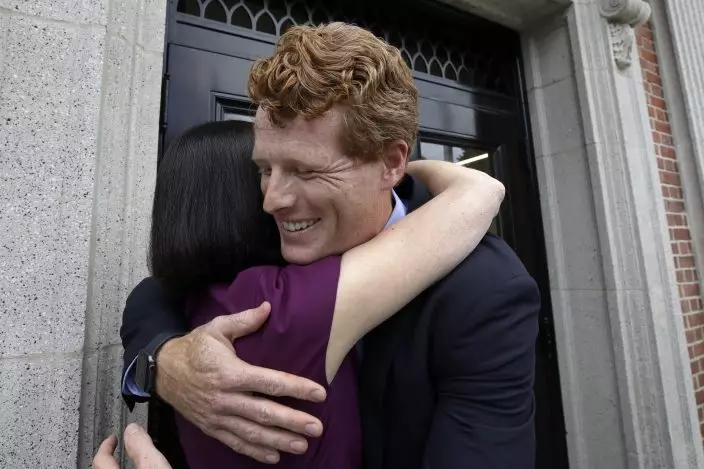
FILE - In this Aug. 27, 2019 file photo, U.S. Rep. Joe Kennedy III, D-Mass., hugs Newton Mayor Ruthanne Fuller on the way into a fire station in Newton, Mass. Kennedy plans to announce on Saturday, Sept. 21, that he will challenge U.S. Sen. Edward Markey, D-Mass., in the 2020 Democratic primary. (AP PhotoElise Amendola, File)
Kennedy is expected to formally announce his decision Saturday morning in Boston. If successful, he would be the fourth member of the Kennedy family to win a seat in the Senate.
It's a battle that assesses not only the post-Camelot strength of the Kennedys but also whether the 38-year-old congressman can join the ranks of a changing Democratic party that has rewarded younger politicians like Alexandria Ocasio-Cortez of New York and Ayanna Pressley of Massachusetts for successfully challenging incumbent Democratic members of the U.S. House.
Last year, underscoring how Kennedy's star has been rising, he was tapped to deliver the Democratic response to President Donald Trump's State of the Union address.
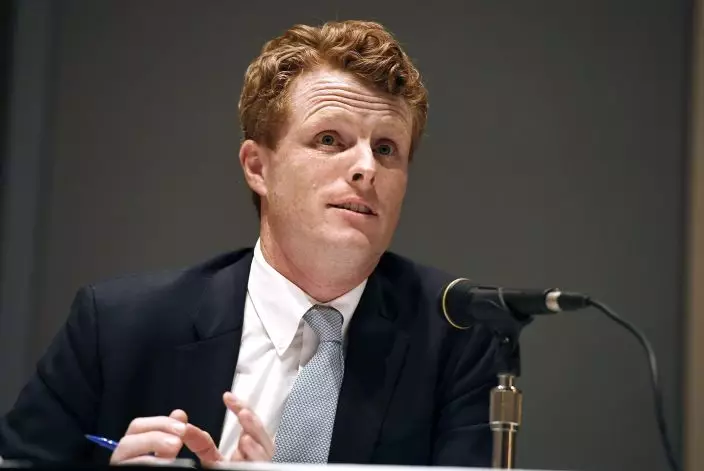
FILE - In this Sept. 14, 2019 file photo, U.S. Rep. Joe Kennedy III, speaks on a panel on race and politics at the Massachusetts Democratic Convention in Springfield, Mass. Kennedy plans to announce on Saturday, Sept. 21, that he will challenge U.S. Sen. Edward Markey, D-Mass., in the 2020 Democratic primary. (AP PhotoJessica Hill, File)
While his name is undoubtedly an asset — he's the grandson of Robert F. Kennedy and son of former U.S. Rep. Joe Kennedy II — many of those watching the budding contest say Kennedy, who has served in Congress since 2013, still needs to make a convincing case to voters.
"Of course people in Massachusetts know the Kennedy name, but it's largely historical at this point," said Mary Anne Marsh, a Democratic strategist in Massachusetts. Marsh noted that Edward Kennedy died a decade ago.
Marsh credited the younger Kennedy for working hard to win his House seat — shaking hands, traveling throughout the district and listening to voters — and said that work appears to be paying off as he weighed a run for Senate, noting two recent polls that showed Kennedy ahead of the 73-year-old Markey.
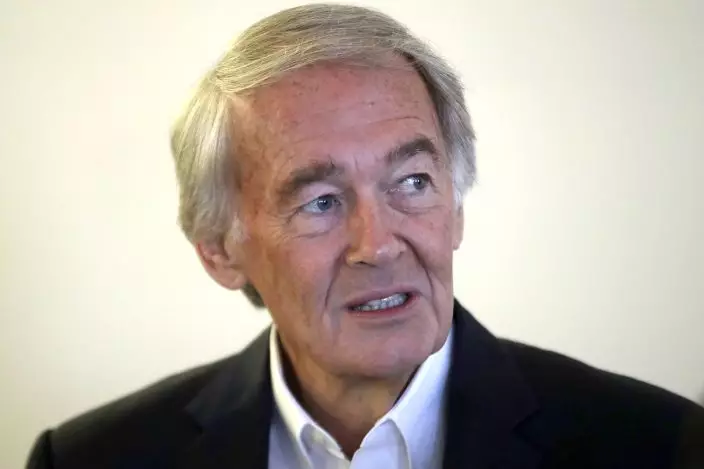
FILE - In this Aug. 26, 2019 file photo, U.S. Sen. Edward Markey, D-Mass., speaks during a news conference in Boston. U.S. Rep. Joseph Kennedy III plans to announce on Saturday, Sept. 21, that he will challenge Markey in the 2020 Democratic primary. (AP PhotoElise Amendola, File)
Marsh also said the single biggest goal Democrats have in the coming election — defeating Trump and undoing his legacy — may play to Kennedy's perceived strengths if he can bring a sense of urgency to the race. That message may be a tougher sell from Markey, she said.
"This election cycle is so different. The test isn't what your name is and where you come from but what you can do to stop Donald Trump," Marsh said. "For Markey, the good news is that he has a long record over 40 years, and the bad news is that he has a long record over 40 years and he's still working on some of those issues."
Others see a tighter contest between the two, despite the Kennedy legacy.
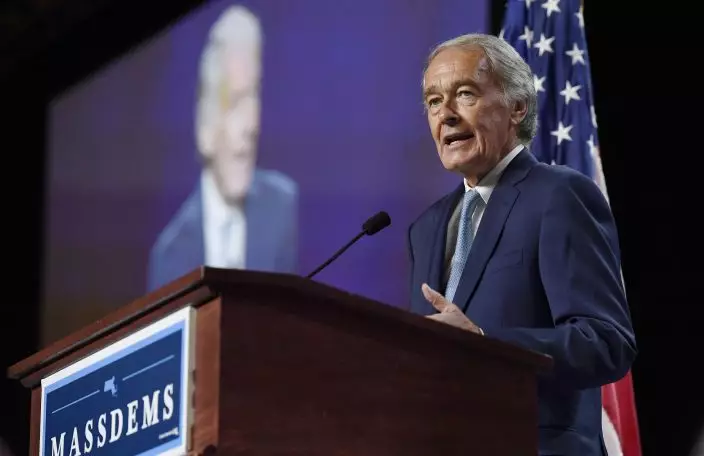
FILE - In this Saturday, Sept. 14, 2019 file photo, U.S. Sen. Edward Markey speaks to delegates during the 2019 Massachusetts Democratic Party Convention, in Springfield, Mass. U.S. Rep. Joseph Kennedy III plans to announce on Saturday, Sept. 21, that he will challenge Markey in the 2020 Democratic primary. (AP PhotoJessica Hill, File)
Erin O'Brien, an associate professor of political science at the University of Massachusetts-Boston, cautions against counting Markey out, pointing to what she said is a generational split among the electorate. Older voters may have an emotional connection to the Kennedy clan that younger voters don't share.
"Younger Democrats care more about the environment and climate change," she said. "At least initially they're rallying around Ed Markey."
O'Brien said that Kennedy — unlike U.S. Reps. Seth Moulton and Pressley, who also defeated Democratic incumbents in Massachusetts — has yet to come up with a strong argument about why voters should dump Markey.
"He is trying to capitalize on squad energy when he has no authenticity to be a member of the squad," she said, referring to a group of four Democratic members of the U.S. House including Rashida Tlaib of Michigan, Ilhan Omar of Minnesota, Pressley and Ocasio-Cortez.
By challenging Markey directly rather than waiting for an open seat, Kennedy also avoids having to run in a crowded primary, which could include other members of the state's congressional delegation.
Unlike Kennedy, Markey didn't inherit a famous political name. His father drove a milk truck and he was the first in his family to get a college degree.
He had been trying to shore up his political support before Kennedy's announcement. Markey has been quick to point to the endorsement of his campaign by fellow Sen. Elizabeth Warren. Warren, who taught Kennedy at Harvard Law School, endorsed Markey in February. She's spoken highly of both candidates.
Equally important for Markey as he tries to woo younger and more liberal Democrats may be his endorsement by Ocasio-Cortez, who teamed up with Markey early on to push the "Green New Deal" climate change initiative.
It's unusual for an incumbent senator to have a serious primary challenge, and most recently, it's happened far more to Republicans.
Markey already faces two lesser-known candidates: Shannon Liss-Riordan, a workers' rights lawyer, and Steve Pemberton, a former senior executive at Walgreens.
Given that there are few strong ideological divides between the two candidates, voters may end up choosing sides quickly, said John Cluverius, associate director of the UMass Lowell Center for Public Opinion.
"This primary isn't about substance or even style, really. It's shaping up to be a 'Seinfeld' primary: In most ways, it's about nothing, but it's going to deeply divide people strongly attached to one side or the other," he said.
UNITED NATIONS (AP) — The United States vetoed a widely backed U.N. resolution Thursday that would have paved the way for full United Nations membership for Palestine, a goal the Palestinians have long sought and Israel has worked to prevent.
The vote in the 15-member Security Council was 12 in favor, the United States opposed and two abstentions, from the United Kingdom and Switzerland. U.S. allies France, Japan and South Korea supported the resolution.
The strong support the Palestinians received reflects not only the growing number of countries recognizing their statehood but almost certainly the global support for Palestinians facing a humanitarian crisis caused by the war in Gaza, now in its seventh month.
The resolution would have recommended that the 193-member U.N. General Assembly, where there are no vetoes, approve Palestine becoming the 194th member of the United Nations. Some 140 countries have already recognized Palestine, so its admission would have been approved, likely by a much higher number of countries.
U.S. deputy ambassador Robert Wood told the Security Council that the veto “does not reflect opposition to Palestinian statehood but instead is an acknowledgment that it will only come from direct negotiations between the parties."
The United States has “been very clear consistently that premature actions in New York — even with the best intentions — will not achieve statehood for the Palestinian people,” deputy State Department spokesman Vedant Patel said.
His voice breaking at times, Palestinian U.N. Ambassador Riyad Mansour told the council after the vote: “The fact that this resolution did not pass will not break our will and it will not defeat our determination.”
“We will not stop in our effort,” he said. “The state of Palestine is inevitable. It is real. Perhaps they see it as far away, but we see it as near.”
This is the second Palestinian attempt for full membership and comes as the war in Gaza has put the more than 75-year-old Israeli-Palestinian conflict at center stage.
Palestinian President Mahmoud Abbas first delivered the Palestinian Authority’s application for U.N. membership in 2011. It failed because the Palestinians didn’t get the required minimum support of nine of the Security Council’s 15 members.
They went to the General Assembly and succeeded by more than a two-thirds majority in having their status raised from a U.N. observer to a non-member observer state in 2012. That opened the door for the Palestinian territories to join U.N. and other international organizations, including the International Criminal Court.
Algerian U.N. Ambassador Amar Bendjama, the Arab representative on the council who introduced the resolution, called Palestine’s admission “a critical step toward rectifying a longstanding injustice" and said that “peace will come from Palestine’s inclusion, not from its exclusion.”
In explaining the U.S. veto, Wood said there are “unresolved questions” on whether Palestine meets the criteria to be considered a state. He pointed to Hamas still exerting power and influence in the Gaza Strip, which is a key part of the state envisioned by the Palestinians.
Wood stressed that the U.S. commitment to a two-state solution, where Israel and Palestine live side-by-side in peace, is the only path for security for both sides and for Israel to establish relations with all its Arab neighbors, including Saudi Arabia.
“The United States is committed to intensifying its engagement with the Palestinians and the rest of the region, not only to address the current crisis in Gaza, but to advance a political settlement that will create a path to Palestinian statehood and membership in the United Nations,” he said.
Mansour, the Palestinian U.N. ambassador, reiterated the commitment to a two-state solution but asserted that Israel believes Palestine "is a permanent strategic threat."
"Israel will do its best to block the sovereignty of a Palestinian state and to make sure that the Palestinian people are exiled away from their homeland or remain under its occupation forever,” he said.
He demanded of the council and diplomats crowded in the chamber: “What will the international community do? What will you do?”
Israeli-Palestinian negotiations have been stalled for years, and Israel’s right-wing government is dominated by hard-liners who oppose Palestinian statehood.
Israeli U.N. Ambassador Gilad Erdan called the resolution “disconnected to the reality on the ground” and warned that it “will cause only destruction for years to come and harm any chance for future dialogue.”
Six months after the Oct. 7 attack by the Hamas militant group, which controlled Gaza, and the killing of 1,200 people in “the most brutal massacre of Jews since the Holocaust,” he accused the Security Council of seeking “to reward the perpetrators of these atrocities with statehood.”
Israel’s military offensive in response has killed over 32,000 Palestinians, according to Gaza’s health ministry, and destroyed much of the territory, which speaker after speaker denounced Thursday.
After the vote, Erdan thanked the United States and particularly President Joe Biden “for standing up for truth and morality in the face of hypocrisy and politics.”
He called the Palestinian Authority — which controls the West Bank and the U.S. wants to see take over Gaza where Hamas still has sway — “a terror supporting entity.”
The Israeli U.N. ambassador referred to the requirements for U.N. membership – accepting the obligations in the U.N. Charter and being a “peace-loving” state.
“How can you say seriously that the Palestinians are peace loving? How?” Erdan asked. “The Palestinians are paying terrorists, paying them to slaughter us. None of their leaders condemns terrorism, nor the Oct. 7 massacre. They call Hamas their brothers.”
Despite the Palestinian failure to meet the criteria for U.N. membership, Erdan said most council members supported it.
“It’s very sad because your vote will only embolden Palestinian rejectionism every more and make peace almost impossible,” he said.
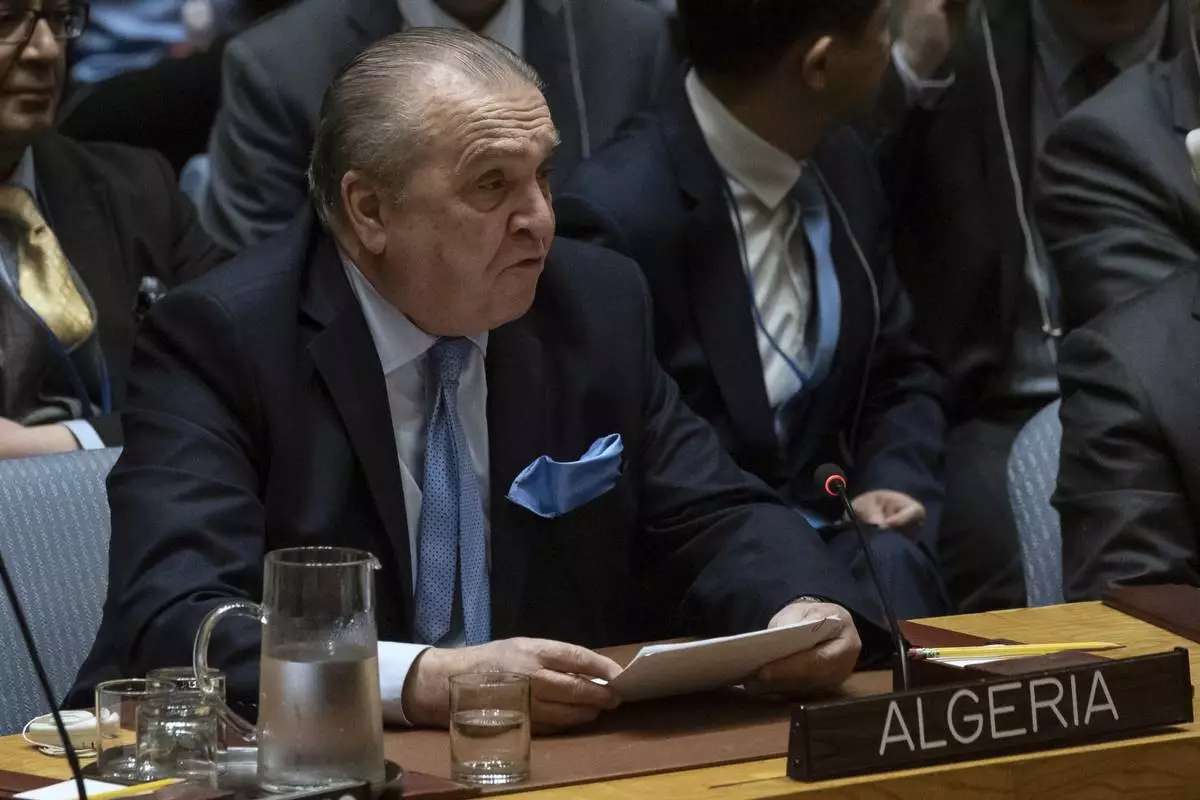
Algeria's Permanent Ambassador to the United Nations Amar Bendjama speaks during a Security Council meeting at United Nations headquarters, Thursday, April 18, 2024. (AP Photo/Yuki Iwamura)
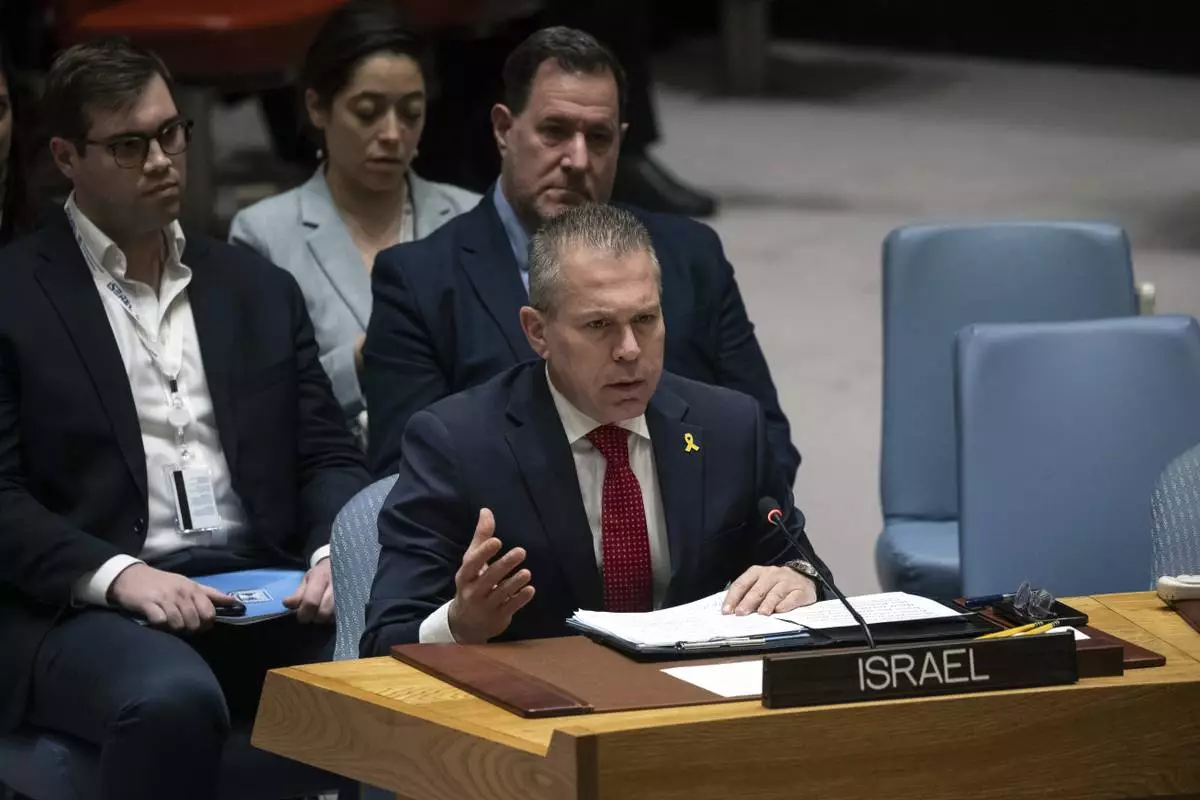
Israeli Ambassador to the United Nations Gilad Erdan speaks during a Security Council meeting at United Nations headquarters, Thursday, April 18, 2024. (AP Photo/Yuki Iwamura)
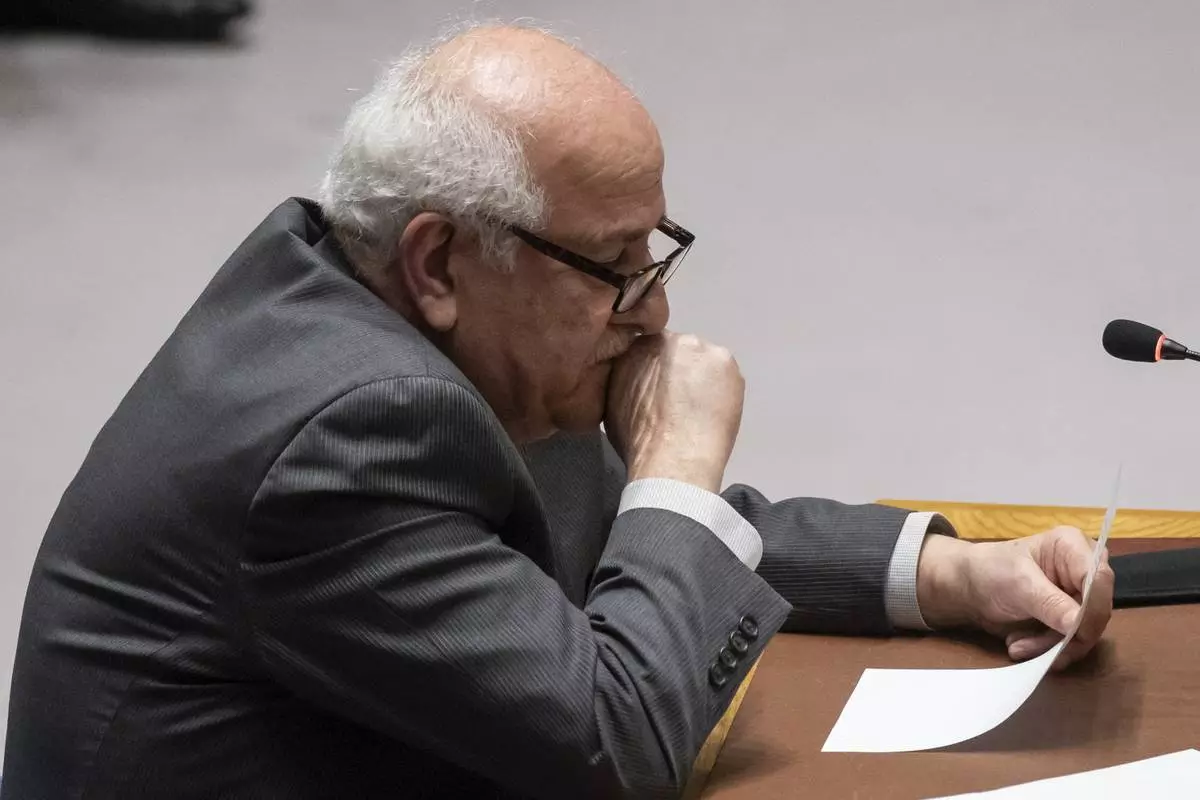
Palestinian Ambassador to the United Nations Riyad Mansour holds tears while speaking during a Security Council meeting at United Nations headquarters, Thursday, April 18, 2024. (AP Photo/Yuki Iwamura)
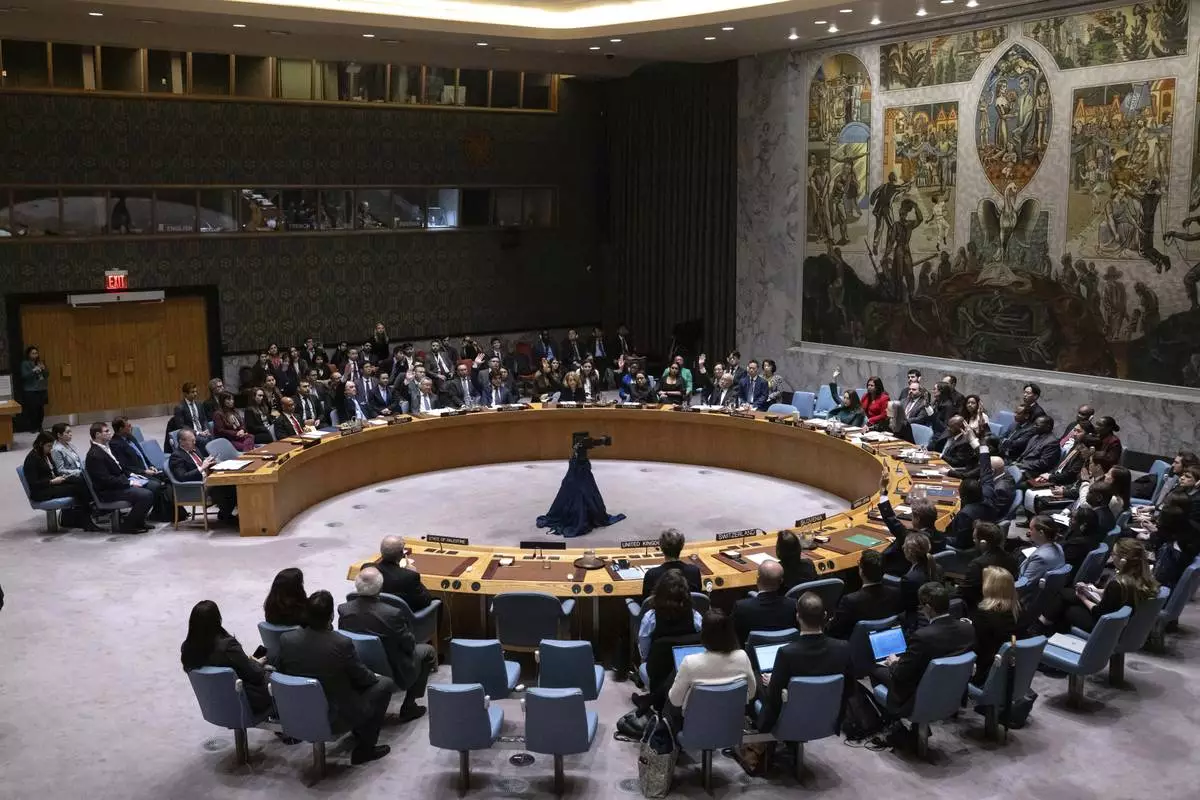
Representatives of member countries take votes during a Security Council meeting at United Nations headquarters, Thursday, April 18, 2024. (AP Photo/Yuki Iwamura)
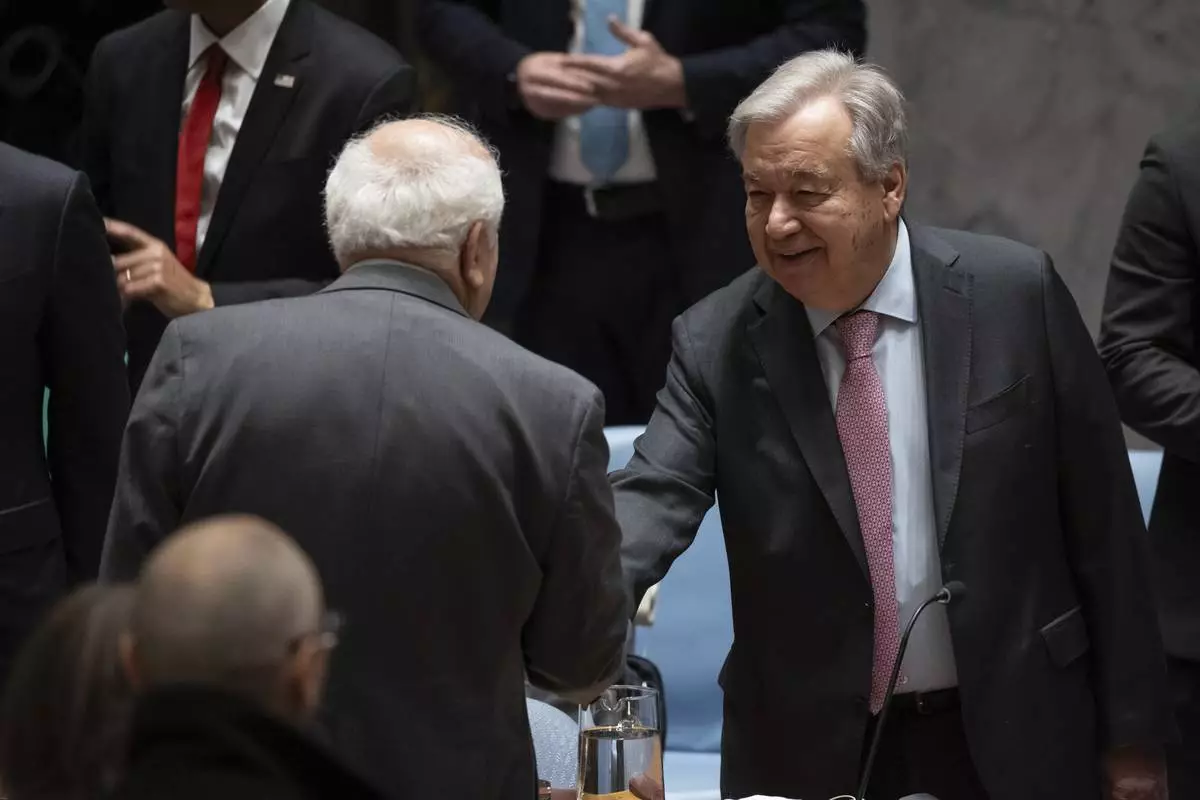
Palestinian Ambassador to the United Nations Riyad Mansour, left, and United Nations Secretary-General Antonio Guterres speak before a Security Council meeting at the United Nations headquarters, Thursday, April 18, 2024. (AP Photo/Yuki Iwamura)
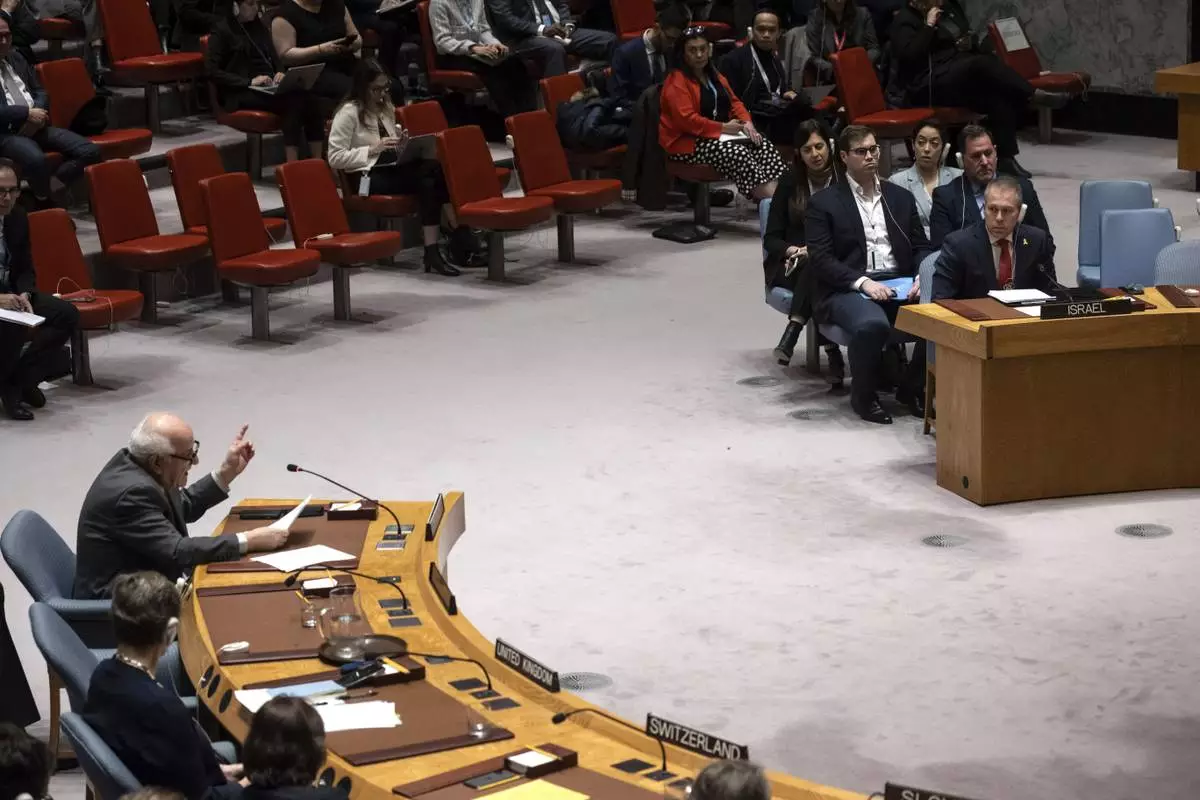
Palestinian Ambassador to the United Nations Riyad Mansour speaks during a Security Council meeting at United Nations headquarters, Thursday, April 18, 2024. (AP Photo/Yuki Iwamura)
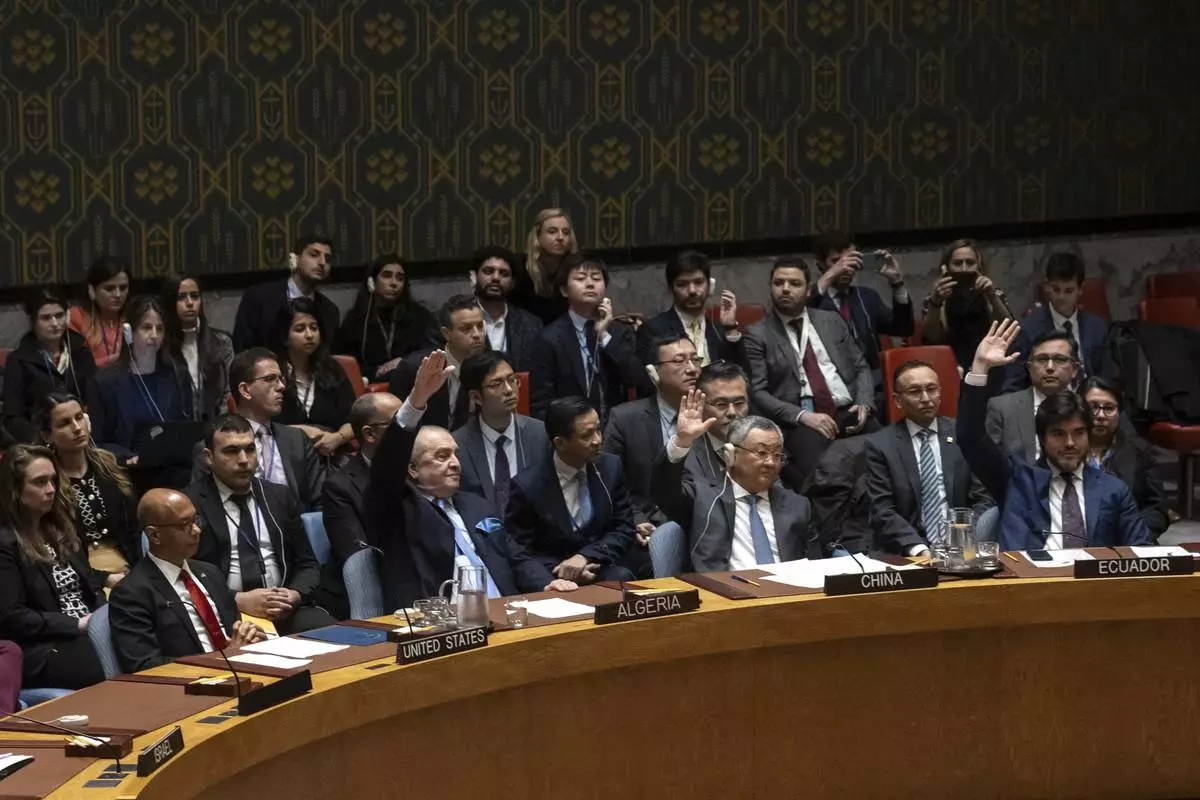
Representatives of member countries take votes during a Security Council meeting at United Nations headquarters, Thursday, April 18, 2024. (AP Photo/Yuki Iwamura)
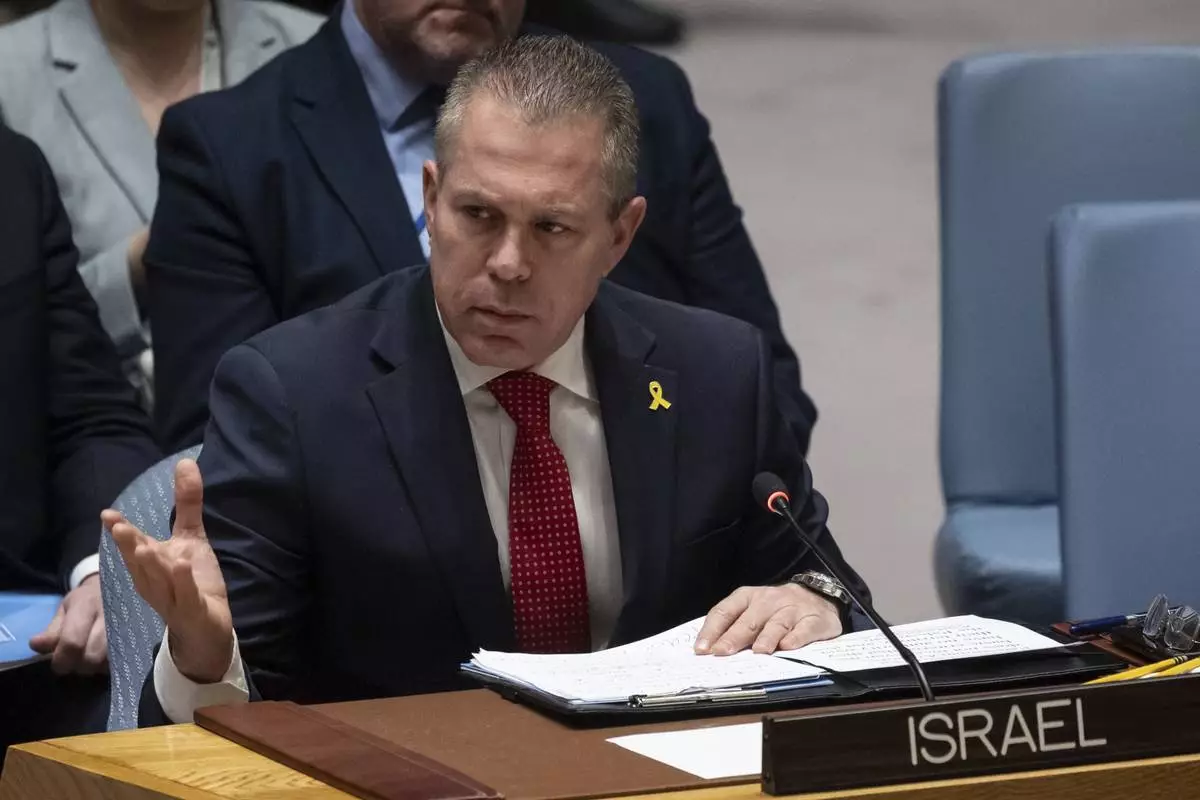
Israeli Ambassador to the United Nations Gilad Erdan speaks during a Security Council meeting at United Nations headquarters, Thursday, April 18, 2024. (AP Photo/Yuki Iwamura)
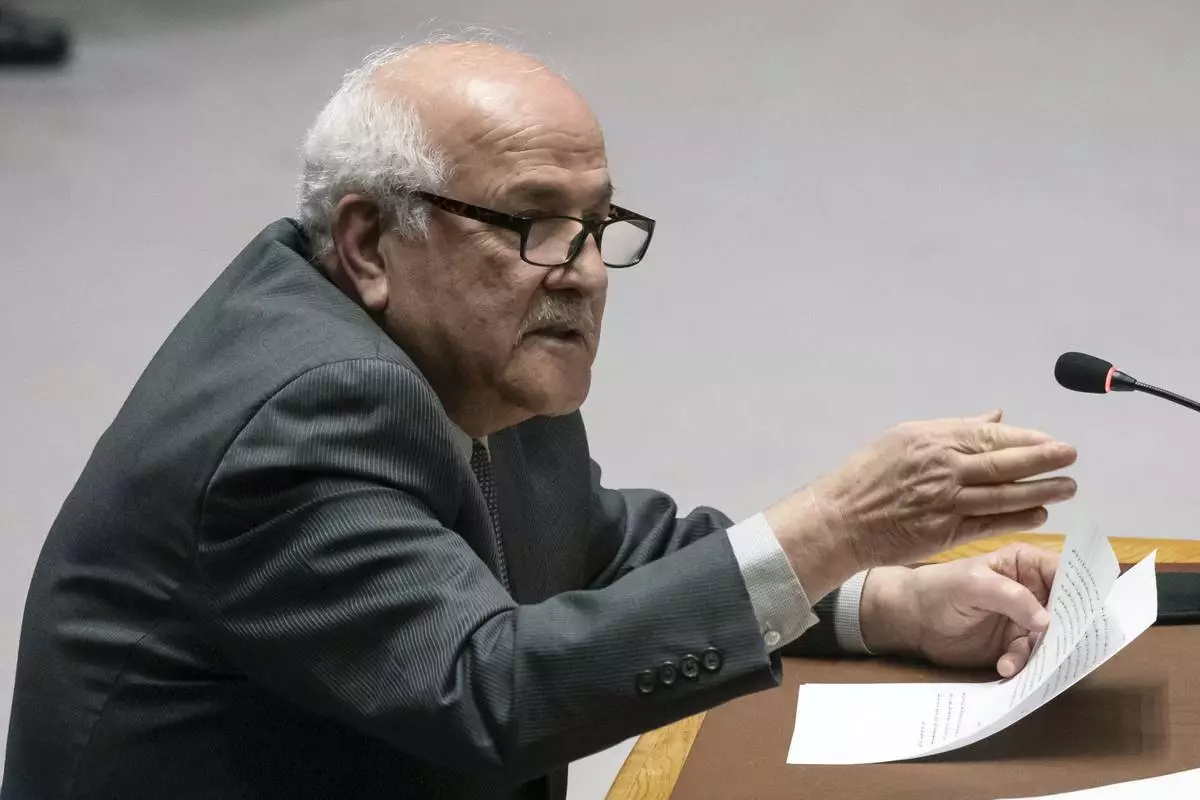
Palestinian Ambassador to the United Nations Riyad Mansour speaks during a Security Council meeting at United Nations headquarters, Thursday, April 18, 2024. (AP Photo/Yuki Iwamura)
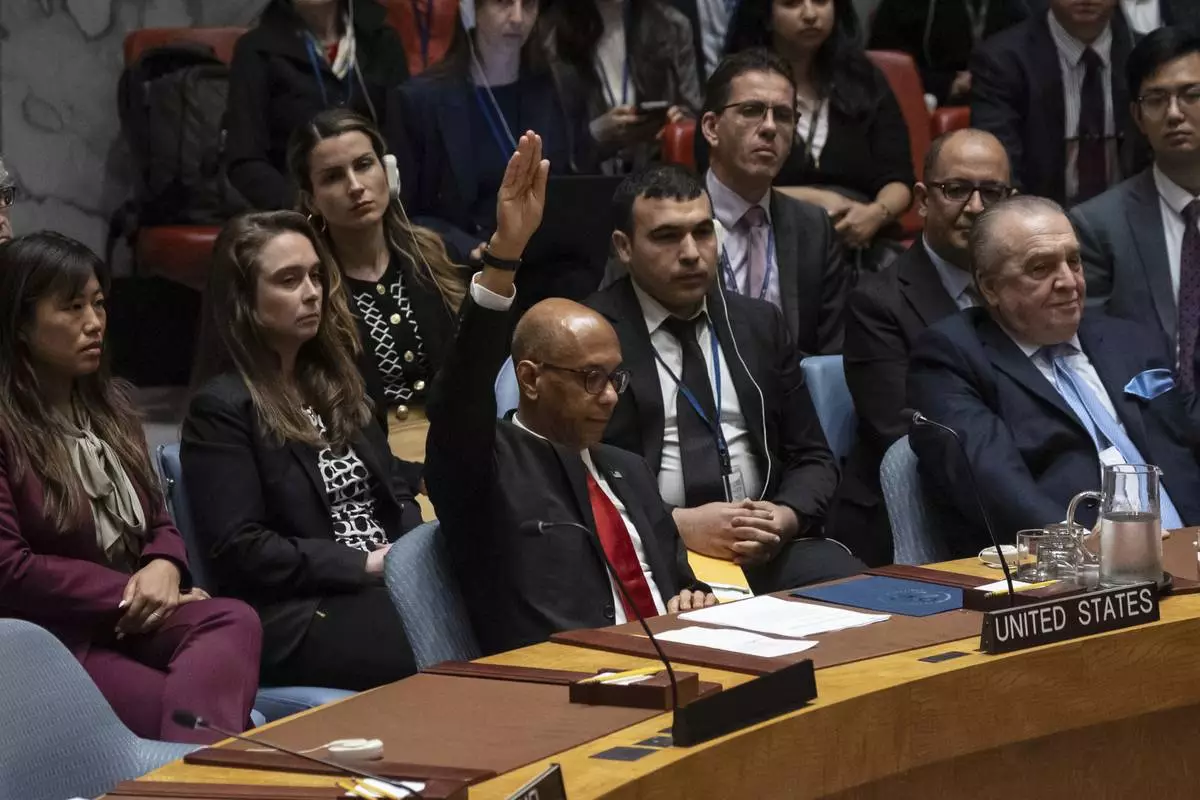
U.S. Deputy Ambassador Robert Wood votes against resolution during a Security Council meeting at United Nations headquarters, Thursday, April 18, 2024. (AP Photo/Yuki Iwamura)























